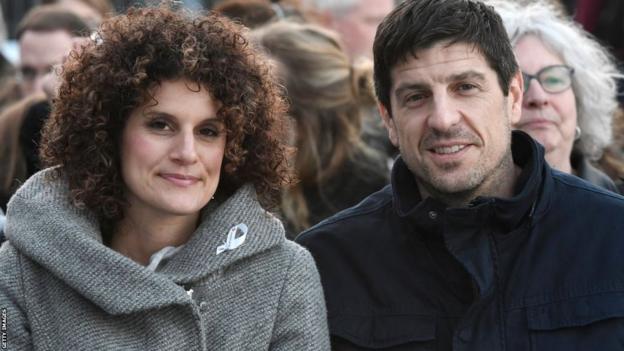Sebastien Bellin: Brussels bomb survivor on Ironman feat and forgiveness
Losing blood, running low on time, Sebastien Bellin knew his choices over the next hour would decide if he lived or…


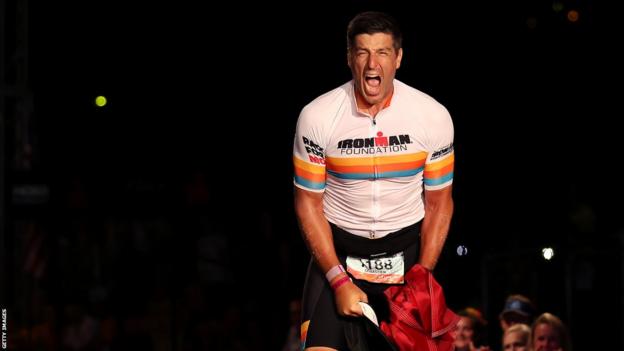
This article features a graphic image and description of the aftermath of a bomb attack
Egg, cheese, bacon, pepper.
A carbonara sauce is simple; a rich mix of fat and flavour to coat pasta.
For Sebastien Bellin, though, the most important ingredient isn’t in any recipe.
The meal that saved his life was made of more.

On 21 March 2016, amid soft lighting and loud laughter, Bellin sat in a Brussels restaurant and shovelled down three plates of carbonara.
Twelve hours later, the Belgian was flat on his back on the floor of the city’s airport. There is a photo of the moment. It is odd.
Initially your eye is drawn to Bellin’s expression. He looks calm, almost serene, as he cranes his neck to look down at his body. But, as you take in the rest of the image, it is clear something is very wrong.
A stripe of dirt covers half Bellin’s face. His trousers are ripped and tattered. His ankles splay skyward, with his legs apparently unresponsive.
Most disturbingly of all, a puddle of blood, thick with iron and ill omen, grows beneath him.
Two blasts, at either end of the check-in area, had just burst from a pair of suitcases and through the crowd.
Sixteen people would die. Bellin could easily have been an additional fatality.
“I remember falling down and my hip exploding,” Bellin says.
“I looked down and saw a mass of bones sticking out. You see dead people, you see body parts, you hear screaming.”
As Bellin’s blood seeped out of him and a numbness crept up from his feet, he knew his life depended on his next few moves.
Fortunately, the prize was also the preparation.
Looking back now, seven years on, Bellin sees how everything that had come before prepared him for that morning.
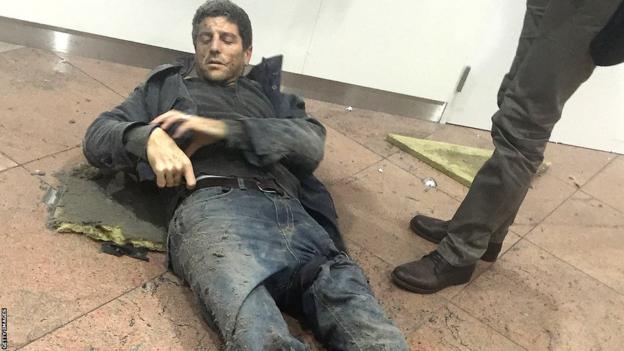
Bellin was born in Sao Paolo. His mother was a physiotherapist – “very hippie, very liberal, just a free spirit” – while his father, a high-flying executive, was more conservative and business-minded.
His father’s career took Bellin and the rest of his family to the American cities of Indianapolis and Philadelphia, and then Denmark, Italy and Belgium.
“It was a nomadic childhood, but from a young age I saw the advantage of having balance in your life, of always seeing two sides to the picture,” Bellin remembers.
“I was always trying to extract the benefits from these diverse and different cultures.”
Bellin’s shortcut into those cultures was always the same: sport.
Initially it was football and tennis. During his time in Italy, football took over entirely. And, when he arrived in Belgium, his school friends convinced their towering 13-year-old class-mate to try basketball. It led to a high-level college stint in the United States and a professional career around Europe.
“Sport is the greatest classroom in the world,” says Bellin. “Everything you need to know in life is there.
“It shows you that there are a lot of different ways. There is not one right way, there is always an alternative.”
Bellin didn’t know what move he would make on the airport floor. But, as he edged towards death, he knew how to begin the search for an alternative outcome.
Sport showed the way once more. He remembered the words of an old coach; Greg Kampe at Oakland University, who had overseen a Division One title during Bellin’s time on the team.
“He always used to say ‘just win the day’,” remembers Bellin.
Kampe’s point was that too many players are caught up in their past achievements or distracted by the imponderables of the future. History and consequence blurred their focus on the present, leaving them vulnerable.
Bellin couldn’t afford to think about what he had in life, or what he might lose in death.
“When I found myself in that moment, I saw it maybe a little differently to others: it is about the now, about the moment,” he says.
“I knew the next hour and a half is the championship game. This is it. You have to beat the moment. You just have to win the day.”
Bellin decided he had to move.
He had asked someone to lift his legs on to a suitcase to slow the flow and used a scarf as a makeshift tourniquet, but the blood loss was too swift. Time was too short.
There were two problems. He couldn’t move and, also, he was told he shouldn’t.
Police officers had formed a cordon around the dead and injured in the terminal building. They told Bellin to stay put while they secured the airport and summoned help.
Bellin was insistent. Their way was not the only way. It wasn’t his way. Not if he was to survive.
He told the police that he would take his chances, that his death would be on their conscience otherwise and convinced a passing porter to lift him on to a luggage trolley and push him to the front of the airport.
His theory was to be where medical help would first arrive. His tactics paid off. Six firefighters, rushing to the scene, found him and carried him to a makeshift triage centre.
Bellin lost 50% of his blood. He almost lost his left leg in surgery. But he won the day.
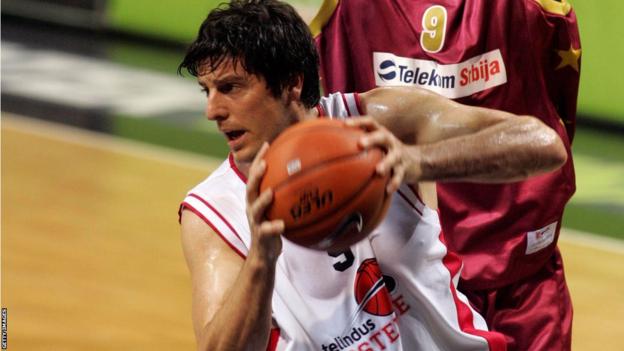
Bellin was something of a celebrity as he lay in his hospital bed.
The photo, snapped by Ketevan Kardava, a Georgian journalist who had been buying a ticket for a flight to Geneva on the same day, had gone viral. He appeared on screens and newsstands around the world.
He gave interviews. He met Kardava again in his ward. Forty-one days after the attack, his young daughters made the trip over from the family home in the United States for an emotional reunion, captured by American television.
But most of the hours were hard, painful and lonely.
Bellin spent three months in hospital. Initially, he was confined to bed, his leg held together by a cage of metal pins and splints. Shrapnel was peppered though his hip. He had skin grafts to cover the gaping wounds.
Gradually he learned to walk again, adjusting to his new disabilities and a new reality. He had no feeling below the knee in his left leg. The metatarsal bone in his foot was removed when an infection started to develop.
Despite his injuries, Bellin was determined sport would not be cut away from him too.
“I am a person who loves movement and I found myself immobile with the news I am going to disabled for the rest of my life,” he says.
“I just needed a pipe dream to stay focused and positive. I wanted the opposite extreme to the situation I was in. For an explosive athlete, that was to run one of the hardest endurance races in the world.”
Bellin settled on an Ironman triathlon, specifically the fabled race in Kona, Hawaii, where history and humidity hang heavy.
Even before his injuries, it would have been a tall order. Bellin is 6ft 9in. At his basketball peak, he weighed almost 18 stone. His previous training was all short, explosive bursts and leaps.
“I think I had done six laps of the track max as a professional athlete, I certainly hadn’t been on a bike or swimming,” he says.
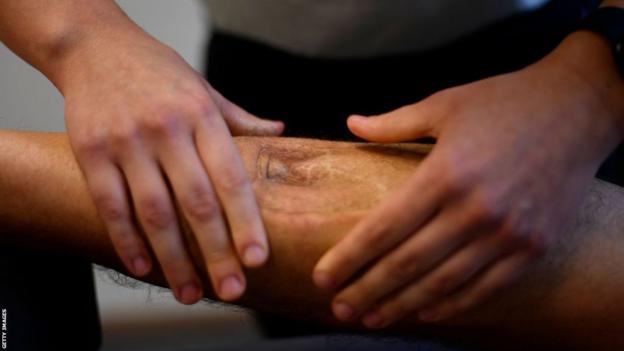
An Ironman consists of considerably more; a 2.4-mile swim and 112-mile cycle followed by a full marathon.
Bellin built slowly and trained smartly. He gently cranked up distance and carefully adapted his kit. He had a special shoe made to help prevent the blisters that would open up unnoticed on his numb left foot.
He suffered setbacks too. Covid-19 delayed one shot at Kona. Then when lockdowns eased and the event returned, he was still learning to trust his legs again after surgery to remove metal supports pinned to the bones.
But in October 2022, six and a half years on from the bombing, Bellin proved his own mettle was stronger than ever, crossing the line in Hawaii in 14 hours, 39 minutes and 38 seconds.
“It was never about how fast I went; the goal was to show myself my body and mind are capable despite this handicap,” says Bellin.
“I don’t want my mindset to accept the state of being a victim.
“I am a survivor and I owe it to the people who died that day – and to my country as a proud Belgian – to constantly overcome. I won’t succumb to this. I have atrophy, I can’t move my toes any more, but if you allow your handicap to be stronger than you are, your condition will slowly decline.”
The one thing that nearly kept him from the finish line was the same that ensured he was on the start line – nutrition.
Bellin, ahead of schedule on his swim and bike legs, failed to adjust his refuelling strategy. He downed an electrolyte drink faster than planned. By the time he got into the meat of the marathon, he was suffering stomach pain and cramps as his body attempted to process an overload of carbohydrates and sodium.
By contrast, on 22 March 2016, Bellin’s appetite had saved him.
Without those three plates of carbonara the night before, his blood sugar would probably have been too low for him to stay conscious. He would have stayed behind a police cordon. He would have lost more blood and possibly, everything.
Luck? Fate? A happy coincidence of sugars and salt in his system?
Bellin disagrees.
“That pasta carbonara story? The whole story? It is not luck one bit,” he says.
That evening, he hadn’t planned to go out for a meal. He had only just returned to Brussels from a day of business meetings in Paris. He was drained. He was booked on the first flight to New York the next day. He wanted only to sleep.
And then his phone rang.
“It was a good friend of mine, Greg. His wife is a teacher along with my wife at the International School in Brussels,” Bellin remembers.
“He said: ‘Hey, we are going to grab something to eat at this Italian restaurant, come with us.’
“I was like, ‘I’m tired, I’ve been in Paris all day’ and I hung up on him.
“Greg calls me back a second time. He says: ‘C’mon, I haven’t seen you in a while, let’s hang out.’
“I told him I was on that first flight to New York and hung up on him a second time.”
Greg was tenacious. He phoned Bellin again. Bellin hung up again.
It wasn’t until Greg’s fourth call that Bellin finally relented.
“Greg finally said, ‘Seb, you have to eat. I love you man, I just want to see you.’
“So I went to meet him and his wife Cara at the restaurant and I ate that first plate of pasta so fast that the waiter brought another two.
“If Greg hadn’t called me back, I would have gone straight to bed, got up, had a glass of water and a banana maybe and run out the door to catch that flight.
“Everyone thinks it is the pasta carbonara, but I would not even have been there to eat it without the love of a friend who I hung up on three times.
“The key was the quality in my life. The love and the passion in it.”
It was the secret ingredient to Bellin’s carbonara. One he adds to everything he can.
“It was the same in sports. I was never focused on stats,” he says.
“I didn’t have jumping ability, I didn’t have good numbers or anything like that, but I had passion and discipline, those attributes that couldn’t be measured.
“It is the same in life. Can you measure love, passion, empathy, tolerance, open-mindedness? You can’t measure these things. They are qualities, not quantities.
“A mindset focused on quantity is always limited and finite. But when you focus on the things you love, because you are passionate about them, because you want to learn, then the possibilities are limitless.”
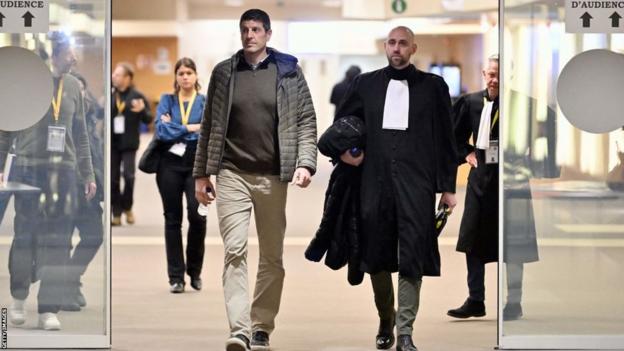
Bellin has gone to places where others might have found their limits.
Last month, he walked through security checks and into the old Nato headquarters, just a few miles west of where he was injured.
There, 10 men, one in absentia, are standing trial, accused of helping plan the attacks on Brussels Airport and, on the same day, the Maelbeek metro station, where another 16 people died.
Mohamed Abrini is one. He brought a bomb to Brussels Airport, but, unlike two of his co-conspirators, did not detonate it, walking out of the building past the injured and dying, before being arrested two weeks later.
Bellin took the stand and asked the accused to look at his face and hear his words.
“Today I’ve decided to forgive you,” he said.
“I’m letting go of the horrors that you are accused of. I’ve decided to reserve more space for love in my life.”
Reflecting on his day in court, Bellin says: “There was a bit of the unknown and some nervousness in me.
“You don’t know what it is going to cause in you. Are you going to feel anger? What are the consequences?
“But as soon as I left the courtroom, I felt a huge amount of relief and a surge in confidence.”
Bellin says justice “has to be done” and those responsible “have to pay the price”, but he is now focused on his family and himself.
“I am very proud of the journey we have been on,” he says.
“We have rebuilt ourselves and adapted to what life threw at us. I want to detach myself from all that mess.
“I will be handicapped for the rest of my life but, at the same time, there are a lot of good things that have come out of this last seven years; I feel I am a better friend, a better husband, a better father, a better person.
“I know I am stronger.”
